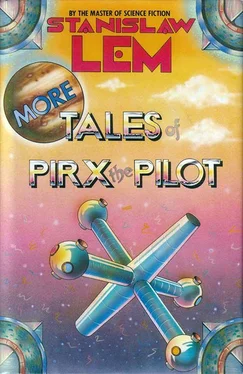Still, he needed hard evidence. A shred, at least. Or even some circumstantial evidence. But he had zilch. One fleeting recollection, from years past, of a medical chart read upside down, a nickname, a handful of gossip, anecdotes, a catalogue of the man’s quirks… To stand before the panel and cite this as proof of the man’s mental instability, as the cause of the shipwreck, would have been lunacy. Even if he impugned the old man’s sanity, there was still the Ares. During the entire reprogramming operation, the ship would be, as it were, blind and deaf. The wildest ideas came to him: if he couldn’t do it officially, why not lift off and warn the Ares from on board the Cuivier, and to hell with the consequences. But it was too risky. He didn’t know the chief navigator. Besides, would he have taken the advice of a stranger? Advice based on mere hypotheses? Without any hard facts? Hm…
So it was Cornelius or nothing. Pirx knew his address: Syntronics Corp., Boston. But how to ask someone so distrustful, pedantic, and fastidious to confess to the very thing he’d spent a lifetime trying to prevent? If he could have taken him aside, worked on him a little, alerted him to the plight of the Ares, maybe then Cornelius would have consented, would have gone along with it—he was, after all, a man of scruple. But how, on that remote Mars-Earth hookup, riddled with eight-minute pauses, talking not man to man but screen to screen, could he accuse a pathetic old man of such a thing, and urge him to confess to having murdered—however unintentionally—some thirty people? Impossible.
He sat on the cot, hands clasped, as if praying. He felt profound incredulity, disbelief: to be so sure of something—and so powerless! His eyes roamed the books on the shelf. They had helped him—with their failed vision. They had been more concerned with those canals, with some distant and hypothetical thing, telescopically viewed, than with themselves. They had argued about a Mars they couldn’t see, the product only of the heroic and fatal visions hatched by their own minds. They had projected their fantasies two hundred million kilometers into space—instead of probing themselves. And those who sought the causes of the calamity in the wilds of computer theory were sadly off target. The computers were as innocent and neutral as Mars, against which he, Pirx, bore an insane grudge, as if the world were to blame for the illusions fostered about it. These antiquated books had done their best. He saw no way out.
On the very bottom shelf, in a row of garishly bound fiction, stood a faded blue volume of Edgar Allan Poe. So Romani was a Poe fan. Not Pirx; he disliked Poe for the artificiality of his language, for the exquisiteness of vision that refused to admit to its dreamlike derivation. For Cornelius, too, Poe was the Bible. Instinctively, Pirx reached for the volume, which flipped open on its own to the table of contents. One of the titles jogged his memory. Cornelius had recommended it to him once, after the watch—a fantastically rigged story of a murderer uncovered. At the time, Pirx had been obliged to sing its praises—a CO, after all, never erred…
At first, he merely toyed with the idea. A schoolboy’s prank, or a blow below the belt? Crude, lowdown, mean—yes, but, who knew, maybe the best solution. A telegram consisting of just four words. But what if he was all wrong? Maybe the medical file referred to another Cornelius; maybe Cornelius ran standard computer tests and had a clear conscience. In that case he’d slough it off as a dumb and exceedingly tasteless joke. But if the shipwreck had piqued his conscience, aroused the vaguest suspicion; if he was gradually being awakened to, but still resisting, his own complicity, then those four words would land like a thunderbolt. Then would come the shock of exposure—for something only partially grasped—and the guilt. Then he couldn’t avoid thinking of the Ares’s impending fate; even if he tried to repress it, the telegram would fester inside him. No more thumb-twiddling, no more sitting back in idle anticipation; the message would get under his skin, gnaw at his conscience, and—then what? Pirx knew the old man well enough to know that he wouldn’t turn himself in, wouldn’t confess, any more than he would start inventing alibis. Once convinced of his guilt, he would do what he thought proper, without a whimper, in silence.
Pirx knew it wasn’t really right. Again he ticked off the alternatives, ready to approach the devil himself—Van der Voyt—if it would do any good. But no one could stop it now. No one. Oh, if it weren’t for the Ares and the race against time… Getting the psychiatrist to break his oath, reviewing Cornelius’s testing methods, tearing down the Ares’s computer—all that would take weeks. So what was left? Soften him up first with a message? One that read… But that would be a tip-off, a dead give-away. Cornelius, with his twisted mind, was sure to plead some excuse, to cite some pretext—not even the most moral person can stifle the instinct for self-preservation. He would go on the defensive, or withdraw into a disdainful silence, and meanwhile the Ares…
Pirx was overcome by a sinking sensation, a feeling of losing ground, like the character in another Poe story, “The Pit and the Pendulum,” defenseless against the force that kept pushing him, millimeter by millimeter, toward the abyss. For what could be more defenseless than to suffer, and because of this suffering to be dealt a dirty blow? What could be meaner?
Scuttle the idea? Nothing would have been cozier than to keep a tight lip. No one would ever be the wiser. They wouldn’t figure it out until the next shipwreck, and after they picked up the scent…
But if it was just a matter of time, if his silence really couldn’t save the old commander, then wasn’t he duty-bound…? Suddenly, as if he had shed all qualms, Pirx went into action.
The ground floor was deserted. Only one operator on duty in the laser-communications cabin: Haroun. The message read as follows: “Syntronics Corp., Boston, Mass., U.S.A., Earth. Warren Cornelius: THOU ART THE MAN.” And below Pirx’s signature, “Member of the board of inquiry investigating the causes of the Ariel’s shipwreck. Address of sender: Agathodaemon, Mars.” That was all. He went back and shut himself up in his room. Later there was a knock at the door, and voices, but he played deaf. He had to be alone now—alone with the mortification that he knew was bound to come. Nothing to do but ride it out.
Later that same night he read Schiaparelli—to keep himself from conjuring up, in a hundred different versions, how Cornelius, cocking his gray, bristling eyebrows, would pick up the telegram bearing a Mars address, unfold the crinkly paper, and hold it up to his farsighted eyes. He didn’t digest a word of Schiaparelli; each time he turned the page, he was suddenly overwhelmed by shocked dismay mixed with an almost childlike pity. Me? Pirx? How could I have done such a thing?
Pirx had guessed right: Cornelius felt trapped. Cornered. The very nature of the situation, dictated by the natural sequence of events, left him no way out, not the slightest elbow room. Taking a sheet of paper, he jotted down, in his neat and legible hand, a few lines of explanation—that he had acted in good faith, that he accepted full responsibility—signed it, and, at 1530 hours, four hours after having received Pirx’s telegram, shot himself in the mouth. No reference to any illness, no attempt at self-vindication. Nothing.
It was as if he acknowledged only that part of the message dealing with the Ares, and had decided to cooperate in the rescue attempt—but nothing else. His response seemed to convey sober approval of Pirx’s action, but also profound disgust with his methods.
Читать дальше












